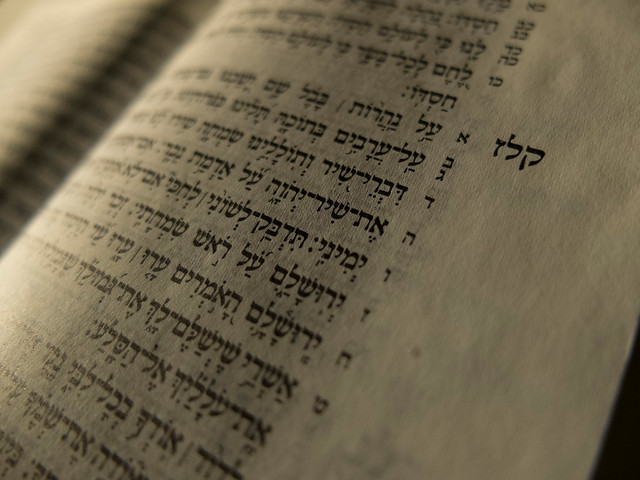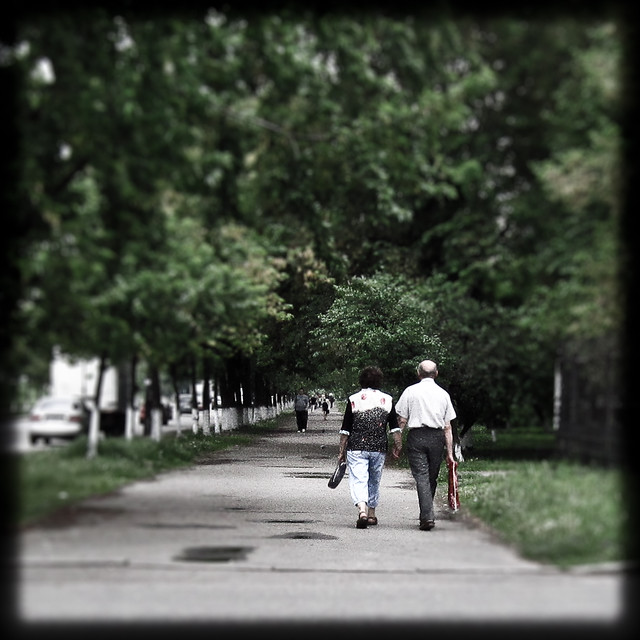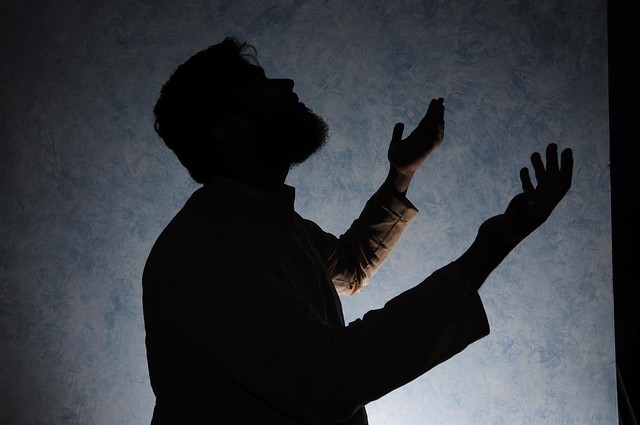We'll call them John and Lisa. They've been married more than 60 years. He served in World War II, she was a cadet nurse. They've gone through a lot together. He still calls her "dear," she still makes him laugh, and I've caught them holding hands a time or two. John talks fondly of the ways Lisa has cared for him through his many health struggles, some the result of war. He talks about struggling with his purpose and wondering why God chose to keep him here when so many of his brothers died. It was Lisa who brought him to know Jesus Christ and it was through her witness that he found his place in this world. Lisa jokes of John's stubbornness, but you can tell that he has always bent over backwards for her, perhaps more so than he always does for friends and people in need. She values his work and his servant heart. They read scripture together and pray together. They are very open with each other.
Service. Faith. Openness. Respect. Love. Commitment. Perseverance.
Those are the things of a good marriage. John and Lisa have them. Unlike some couples their age, I really think they would be fine going another 60 years together.
In 2013,
Morrie and Betty Markoff celebrated their 75th wedding anniversary. Betty was asked what their secret was. She said, "You have to speak each other’s language. And I don’t mean French or Spanish. I mean, listen to what they’re saying."
When I lead couples through premarital counseling, we discuss such things. We discuss the tremendous gravity of committing to another person for a lifetime, a person who will undoubtedly change over that amount of time. I tell them the story of one of my seminary professors who always ended our evening class early so he could go eat with his wife, something he did every night even though she stared into space and no longer recognized him. We talk about things like
agape love—love as commitment. We talk about mutual submission and this deep mystery of the joining of two souls who promise to walk through life together as one, promising to do so up until the moment one is left standing over the grave of the other.
That is the stuff of marriage.
But there's one thing I never hear. Whether talking to long-married couples or engaged couples, there's something that never comes up. And yet, this one thing that never comes up in substantive conversations about marriage is the one thing that took the question of marriage all the way to the Supreme Court and is dividing the country. This one thing that no couple thinks about with their own marriage is apparently the litmus test for the marriage of others:
A complementary set of genitalia.
Now, make no mistake, I'm not saying that gender doesn't matter in any area of life. It does, and gender identity is arguably a separate issue. But it's not gender per se that precedes falling in love; it's attraction. You don't fall in love with someone to whom you're not attracted—physically, emotionally, or otherwise. I'm attracted to the opposite sex. But for a small portion of the population, that attraction is to the same sex. But we both have deep, inexplicable things going on inside of us when we fall in love. We both long for companionship. We both want intimacy. We both want someone with whom we can share anything and make mistakes and still be loved.
I've wondered: why is the government in the marriage business to begin with? Marriage is a deep spiritual reality woven together by the intangible values I listed above. What has Uncle Sam to do with such things? We could have solved this problem simply a long time ago: have government regulate contracts of joint property ownership, etc., but don't call it marriage. Leave marriage—a spiritual commitment—to the religious institutions, where it belongs. That way, a church can decide who to marry and the government can treat all citizens equally under the law as the Constitution says it must. Instead, our Supreme Court has rendered another decision on
marriage which is only going to divide our country further and spur more conflict, hatred, and violence.
Let each church and pastor speak to marriage as they wish. This raises the question that I've never directly addressed in writing until now: How
should pastor and church speak of marriage? Allow me to offer a perspective.
There's a widely held assumption about marriage, often repeated but nevertheless false: the notion that by allowing gay couples to marry, we are redefining marriage for the first time in history. When most people use the term "traditional marriage" they are referring to a relationship that is: 1) between only one man and only one woman, and 2) freely chosen by both partners. Defined this way, traditional marriage is not a historical precedent but a recent phenomenon. In biblical times and places, marriage was never chosen by the woman and was little more than the transfer of property for the purpose of being fruitful and multiplying (Gen 1:28). The male's lineage was paramount. Having many wives and concubines, a frequent aspect of Old Testament stories, was a sign of wealth and status; a man could have as many as he could afford. As one bumper sticker facetiously put it: "The fact that you can't sell your daughter for three goats and a cow means that we've already redefined marriage." In the 1967 case
Loving v. Virginia, the Supreme Court said that the institution of marriage must expand to include interracial couples. People used to appeal to scripture and "God's natural law" to argue against interracial marriages. There were even occasions on which
the courts did so. Marriage was redefined. In a rarely cited
case in 1981, the Supreme Court struck down a law in Louisiana that recognized the man as the "head and master" in a marriage. Throughout history, men always had that status, "for millennia." Marriage was redefined.
Scripture and culture are always in dialogue with each other. We have now allowed
biblical principle to speak louder than biblical precedent, and have come to believe that by allowing both the man and the woman a choice, we honor their equal status as being made in the image of God (Gen 1:27). By allowing biblical principle to speak louder than biblical precedent, we see that while procreation is certainly a gift from God which many heterosexual couples are endowed with the natural ability to do, there can be many other high purposes. We have seen that marriage can be a prime place for realizing the difficult but blessing-filled work of mutual submission (Eph 5:21), self-sacrificial service (Phil 2:3-4), and loyalty (Rom 12:10). For this reason, few people anymore speak of denying marriage to elderly couples or infertile couples, even though they can no more naturally produce children than a same-sex couple.
We now recognize that deviations from what is "natural" are acceptable, or even necessary, for the nurture and well-being of children. It may be more biologically natural for parents to raise children of their own flesh and blood, but every day children are brought into more God-honoring situations by adoptive parents. When it comes to same-sex couples adopting children, it is often argued that it won't be good for their children because of all the stigma, stereotyping, and bullying they may face. But those negative factors are our fault. Children of gay parents only face such things because we perpetuate that cultural atmosphere. As a TV personality likes to say, "Don't pee on my leg and tell me it's raining."
Jack Evans and George Harris have been a couple for 54 years. They have loved and served each other for longer than I've been alive. They never once wanted to damage any heterosexual couple's marriage. They've never been sexually promiscuous or abusive to children, which people long assumed was true of all homosexuals. They've lived life together, paid their taxes, and contributed to society. Such a reality was nowhere in view for any of the biblical authors, even when they appear to discuss homosexuality.
Leviticus 18:22, in the King James Version, says, "Thou shalt not lie with mankind, as with womankind: it is abomination." The same Hebrew word that is here translated "abomination" is also used for other things in the Levitical law that we today consider silly, like the eating of anything from the sea that doesn't have fins and scales (Lev 11:10). This has led to the hilarious website "
God Hates Shrimp," in response to the "God Hates F**s" slogan employed by the Phelps of Westboro Baptist Church.
Scholars can explain this better than I, but the ancient Hebrew law codes express a profound sense of order and strict categories. Certain things had "their place," and these ancient peoples who lacked any knowledge of biology operated with great caution in the face of things that were "out of place" or didn't belong. For example, blood was highly respected as a person's life source from God. It was not to be handled carelessly or eaten in animals (Lev 7:26-27). Blood belonged in the body, and so men were not to approach women during their menstruation (Lev 18:19). Likewise, in sexual relations, the sense of order dictated that the man was the dominant actor and the female was the passive receiver. Some scholars have convincingly argued that the problem was more about the idea of a male playing a passive role than the two being the same gender, which would explain why there was no correlating command for women.
The infamous
story of Sodom and Gomorrah is sometimes cited in arguments against homosexuality, but there seem to be much more pressing offenses in this story. First, this was attempted gang rape and sex for sport. "Where are the men who came to you tonight? Bring them out to us so that we can have sex with them" (Gen 19:5). Second, the men who came to Lot were supposedly angels (Hebrew: "messengers"), and for the men of Sodom to do this would have been to "go after strange flesh," as the original Greek of Jude 1:7 says. Thirdly, to allow this act of exploitation would have been a serious violation of their cultural code of hospitality, which Lot expresses: "Don't do this wicked thing...for they have come under the protection of my roof." Ezekiel 16:49 says, "Now this was the sin of your sister Sodom: She and her daughters were arrogant, overfed and unconcerned; they did not help the poor and needy." Of course, don't forget that Lot's solution to this conundrum was to offer up his virgin daughters to be raped instead (Gen 19:8). As hard as it is for us to understand, in that culture, the protection of his male guests was paramount and victimizing his daughters was the lesser of two evils.
One of many reasons you can't just quote Bible verses out of context.
In the New Testament, we meet more unseen cultural factors and translation issues. Paul was writing to Greco-Roman cultures which were highly sexualized, and in which the predominant human sexual object was not the young, skinny woman of today's culture but underage, effeminate boys. Pederasty was common, and it was all jumbled up with Greek philosophy and gods. This is why Paul, in Romans 1:26-27, connects "unnatural" sexual desires as a consequence of idolatry. He was addressing this flaunting and abusive culture of idol worship (and body worship). Americans today are prudes compared to the people of that time. It's also clear that he's talking about the problem of "being inflamed with lust," not love.
In 1 Corinthians 6:9, the 1984 NIV says, "Do you not know that the wicked will not inherit the kingdom of God?...Neither the sexually immoral nor idolaters nor adulterers nor male prostitutes nor homosexual offenders..." This verse is one of the few cases in which older translations like the King James Version did a better job. The KJV says, "...neither fornicators, nor idolaters, nor adulterers, nor effeminate, nor abusers of themselves with mankind." Wait a minute. Notice the word "effeminate." What's with that? Well, according to scholars, that's a fair translation of the original Greek word
malakoi. The root word means "soft." It was a very common word (which, interestingly, is used in Matthew 11:8 as a euphemism for extravagant clothing). It was dishonorable for men to be "soft" or effeminate. Such men could have been born that way or been eunuchs, and were sometimes exploited as male prostitutes, as the NIV translation suggests.
The word the NIV translates as "homosexual offenders" is
arsenokoitai. Unlike
malakoi, this was not a common word at all, and some scholars even think that Paul may have coined the term. Its meaning is very unclear, but later, non-biblical Greek documents use the word to describe different forms of abuse and exploitation that are not exclusively sexual in nature. The KJV word choice of "abusers" probably captures the essence. Also, notice that "idolatry" is slipped in the list. What is idolatry doing in a list of sexual sins? Again, the two issues were closely related in Greco-Roman culture.
Based on all of these factors, I believe that the Bible does not address same-sex attraction or same-sex relationships at all. To them, there was no such thing. I can't help but remember then Iranian president Mahmoud Ahmadinejad
telling an American audience in 2007 that homosexuals don't exist in his country. If a modern leader can say that, it's not hard to imagine the same mindset more than 2000 years ago. There was no such thing as a homosexual. Any such person would have been thought of as a heterosexual who was just deviant or perverted. Some scholars have suggested that ancient societies saw homosexual behavior as an expression of "lust overload," an excess of sexual desire, something people did when heterosexual sex was not enough to satiate them. Ironically, people today are more bothered by constrained homosexual relationships than they are excessive heterosexual expression.
It's hard to see how Jack Evans and George Harris pose the more serious threat to the fabric of our society and our life with God. What the Bible seems to address are situations of abuse, exploitation, or other cultural perversions that don't honor the image of God in a person. The Bible has much more to say about why
Josh Duggar is immoral than why Jack and George are immoral. Scripture has much to say about what shows love for God and love for neighbor. Perhaps, if we disagree on what the Bible says about homosexuality, can we at least agree that it shouldn't be a top priority or a linchpin issue, given how infrequently the Bible mentions it? As Dwight A. Moody
recently asked, "Where is all this travail at the other signs of the wickedness of the world, the marks of society that run counter to the kingdom of God that have dominated our culture for many years?" Does the issue of homosexuality merit the focus we've given it while we are daily complicit in systems that perpetuate poverty and injustice, issues the Bible mentions hundreds of times?
Jesus was once asked a question about marriage (Matt 19:1-12). Some Pharisees wanted to know if Jesus followed the law of Moses which made it very easy for a man to divorce his wife (Deut 24:1-4). He reaffirmed the Genesis narrative of creation, that God "made them male and female" and that "a man will leave his father and mother and be united to his wife, and the two will become one flesh." Then he said, "What God has joined together, let no one separate."
There are many Christians today who may have softened their viewpoint on homosexual orientation but still cannot affirm same-sex
marriage because of this clear reaffirmation from Jesus. I think that's fair and understandable, and no Christian should be called a bigot for echoing this affirmation. But there's a very important part we miss. The Pharisees go on to ask Jesus why Moses gave men permission to divorce their wives for any reason. Jesus essentially explains that it was a concession at the time, but that it was "not this way from the beginning." Then he drops the bombshell: "I tell you that anyone who divorces his wife, except for sexual immorality, and marries another woman commits adultery." After this, Jesus' listeners came to the same exasperated place that Paul did: we might be better off not marrying at all (see 1 Corinthians 7).
The problem with using the Matthew 19 passage to oppose same-sex marriage is that Jesus wasn't talking about same-sex marriage, he was talking about opposite-sex divorce. He clearly and strictly forbids divorce for any reason except infidelity, and says that men who divorce their wives for any other reason commit adultery by remarrying, as does any man who marries the divorced wife.
But you may notice that there are few Christians out there trying to make this part of the Bible the law of the land.
Here's what Jesus did: he taught who God was. He taught what the ideal was. He told people to strive for that ideal. But he also offers as much grace as we need to fill in the huge gaps we leave. We know that life circumstances, imperfection, and even the fallen nature of creation itself (Rom 8:20-22) create a situation where we must do the best we can and offer each other grace along the way. That's why weddings of Christian divorcees happen all over the country without protests, lawsuits or courts despite Jesus' clear teaching. "
No fault divorce," a widely accepted legal provision, is not "biblical" either. We often face situations where there is no "right thing" but only "the better thing." We now recognize that divorce and remarriage, though it may have never been God's ideal at the outset, is part of our world and in many instances represents a more God-honoring reality than the alternative. If we can do that with divorce in light of a clear and forceful teaching from Jesus, we're left with the question of why we can't do it for same-sex relationships, a topic Jesus never mentioned.
When it comes to human relationships, there are things Christians watch and support all the time that we consider benign but have been slowly eroding our vision for self-sacrificial relationships of commitment and loyalty. It's hard to find a sitcom, song, or movie that doesn't treat things like marriage and sex casually. We consume this entertainment all the time without a thought. Same-sex couples have been the scapegoat for the breakdown of the American family, even though that breakdown began long ago. If a family is in strife, it's more likely because they don't pray together than because their gay neighbors are together. I see lots of troubled relationships, and they're not troubled because Jack and George want to get married. I see marriages that are cold and distant in which the two barely even talk to each other any more, and I fail to see how that is preferable or morally superior to a joy-filled gay relationship.
The church needs to reclaim its witness to self-sacrificial relationships of fidelity more than it needs to solidify its position on gay marriage. Much time and energy has been spent on shouting that marriage is between a man and a woman, a statement that says nothing about what makes a marriage rich, vital, and lasting. Have you noticed that we seem to focus on the sexual aspect of these relationships, neglecting the fact that in day to day life they look much like our own relationships.
Let's live and prove what we believe about the sanctity of marriage. "Sanctity" comes from a word that means "set apart." We have a grand opportunity to show what this really means. We've lost our credibility. Let's get back to the real deal: Service. Faith. Openness. Respect. Love. Commitment. Perseverance. That's the stuff of "the narrow gate" that few find (Matt 7:13-14). Prejudice, judgment, and suspicion are easy. They seem to come naturally. It's time to reclaim our truly counter-cultural witness on marriage...and all human relationships.













